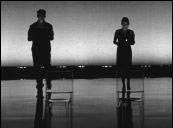THE DYING GAUL
Intiman Theatre, Seattle Center 269-1900, $10-$42 7:30 p.m. Sun. and Tues.-Thurs.; 8 p.m. Fri.-Sat.; 2 p.m. matinees Sat.-Sun.; also 2 p.m. Wed., Aug. 15 ends Sat., Aug. 18
DESPITE MUCH that leaves you dismayed, something about the Intiman Theatre production of Craig Lucas’ The Dying Gaul works. The evening stumbles about, but at last falls compulsively forward.
Lucas’ corrosive Hollywood tale casts a shadow on people in search of real feeling in a town—in a world—where less and less is real. Robert (Jay Goede) is a young gay writer who has penned an elegiac screenplay in memory of his recently deceased lover. Burdened by bills and an incomprehensible sadness, he sells out the purity of his work for a million dollars and a fling with bisexual producer, Jeffrey (Laurence Ballard). The situation worsens with the involvement of Jeffrey’s yearning, frustrated wife Elaine (Myra Platt) and Robert’s guilt-ridden therapist (David Pichette).
As in Cymbeline, Intiman’s season opener, director Bartlett Sher—who is going to knock our socks off when his quirky elegance meets the right vehicle—gives the show a distinctive, fluid beauty. There is gorgeous work from set designer Andrew Jackness and lighting designer Mary Louise Geiger (a miniature swimming pool in the glossy black floor fairly glows), and Sher has gone so far as to choreograph the graceful movements of his set-changing ensemble.
His leads, however, are a mixed bunch. Though his good-humored bravado is always watchable, Ballard tends to showboat without proper limits, and Sher lets him do everything here but sing “Ol’ Man River.” Goede’s grief is a palpable open wound when he’s not gushing Lucas’ lyricism, and Pichette does well with a role that is essentially plot fodder. Platt is scrappier than she should be, but touches rather movingly on her character’s desperation.
Lucas starts to preen in his anger, but a compelling undercurrent tugs you into the play’s despair. The show has the look and cool, bottled fury of a particularly bleak film noir, emoting in a shimmering darkness and reeling right past every ludicrous plot twist (and, be warned, there are many). The emotions here are so raw that Lucas inches close to gaucheness, yet there isn’t a single guarded moment; the thing is oddly propelled by its open contrivances. With this play, written just after the death of his own partner in 1995, Lucas inspires a feeling of inalterable loss.
Steve Wiecking
THE FOREIGNER
Knutzen Family Theatre, 3200 S.W. Dash Point, Federal Way, 253-661-1444, $16-$19 8 p.m. Thurs.-Sat.; 2 p.m. matinees Sun. ends Sat., Aug. 18
ED HOFMANN has a wonderful face. At times of great embarrassment or worry, his eyebrows huddle over his doe eyes and his mouth slowly stretches out into a painful, toothless grin. As cringing Englishman Charlie Baker in Larry Shue’s The Foreigner, Hofmann gets maximum mileage out of his mug, not least because his character is pretending to be some exotic, non-English-speaking foreigner so he won’t have to talk to any of the chatty locals in a Georgia fishing lodge. Where words won’t do, a simple look of terror or an awkward shuffle from Hofmann’s lanky frame is enough to keep the audience on the brink of giggles.
Hofmann is surrounded by an admirable Centerstage Theatre ensemble, who take the broad strokes Shue hands them—simple-minded Ellard (David Sampson) teaches Charlie to speak English words in a thick Southern accent—and paint a colorful picture. The only weak link is Patrick Braillard, whose dastardly Reverend Marshall Lee is more wooden than wicked.
The play doesn’t pick up until the second half; we spend much of the first being introduced to the characters who call the lodge home. But once we’re allowed to settle into the rhythm of lodge life, Hofmann dodges and weaves potential hazards with comic aplomb, from the motherly attentions of batty Betty (Rosalie Hilburn) to the constant confessions of the ex-debutante Catherine (Trudy Barnett) and the threats of the thick-skulled xenophobe Owen (Douglas Sampson). Centerstage may have chosen this oft-produced play for a comedy built easy to please, but Hofmann ensures that we’re not only amused but also rooting heartily for him to triumph in his adventure.
Molly Rhodes




